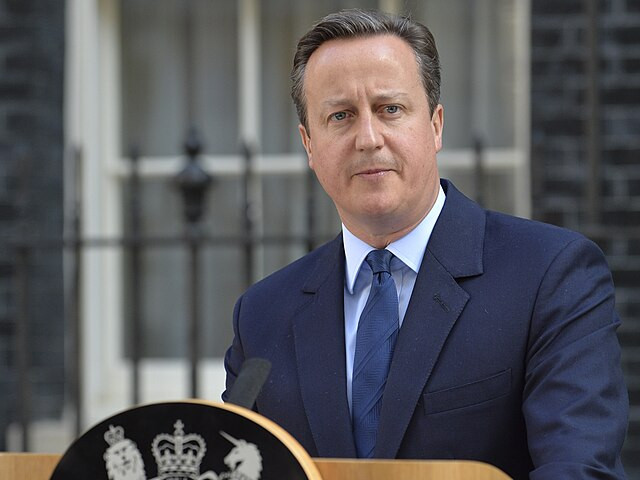In a significant cabinet reshuffle on November 13, UK Prime Minister Rishi Sunak dismissed Home Secretary Braverman and announced that Foreign Secretary Cleverly would replace her. Subsequently, former Prime Minister David Cameron was confirmed to fill the vacancy in the Foreign Office.
Braverman's dismissal was triggered by her numerous divisive statements during her tenure. Over the previous weekend, she condemned a pro-Palestinian protest in central London, leading to widespread dissatisfaction among officials. Yvette Cooper, the Shadow Home Secretary from the Labour Party, criticized Braverman's remarks as destructive to domestic politics and irresponsible.
Cameron, 57, who has been away from the political arena for seven years, was unexpectedly reappointed to such a significant position, surprising many international media outlets. Reuters commented that Sunak's decision was unexpected. Cameron resigned following the Brexit referendum results in 2016 and left British politics entirely in September of the same year by resigning as a Member of Parliament.
Later on November 13, King Charles III granted Cameron a life peerage, allowing him to enter the House of Lords without being an elected MP and qualifying him to serve as Foreign Secretary.
UK Continues Support for Israel, Focused on Peaceful Mediation
This year, the UK has completed several important international issues. The Sunak government has maintained a principle of mediation in external conflicts.
In February, the Sunak government reached an agreement with the EU on the post-Brexit trade dispute over Northern Ireland, agreeing to replace the "Northern Ireland Protocol" with the "Windsor Framework Agreement," effectively easing relations between the UK and the EU. Additionally, the UK has reached immigration agreements with France, Italy, and Albania and hosted an international summit on AI security.
On the same day, Sunak delivered his annual foreign policy speech at London's City Hall. He stated that these diplomatic achievements demonstrate the government's willingness to take action to shape the world rather than be shaped by it.
While Sunak expressed support for a peaceful resolution of the Israeli-Palestinian conflict and called for humanitarian aid for civilians in Gaza, he emphasized that these efforts must be supported by Israel. Sunak indicated in his speech that the UK government would adopt a "calm" foreign policy in the Israeli-Palestinian conflict, continuously striving for a two-state solution.
Cameron, the new Foreign Secretary, once described Gaza as a "prison camp" and is now a firm supporter of Israel. During his tenure as Prime Minister, he criticized Israel for establishing settlements in the West Bank and condemned the blockade of Gaza, considering it a "prison camp" existence.
Just two days after the recent Israeli-Palestinian conflict, on October 9, Cameron stated on social media platform X (formerly known as Twitter) that he firmly supports Israel and fully backs the choices of the UK Prime Minister and the government.
Ben Whitham, a professor of international relations at the School of Oriental and African Studies (SOAS) in London, suggested that Cameron's future statements on the Israeli-Palestinian conflict might focus on appeasement and mediation, with a certainty that they will not favor the Palestinian side.
The Golden Era of Sino-British Relations Ends, Cameron's Return Anticipated
During Cameron's tenure, Sino-British relations developed rapidly, with extensive cooperation between the two countries. Cameron, who served as the 53rd Prime Minister of the UK from 2010 to 2016, actively promoted Sino-British trade cooperation, signing several bilateral economic and trade agreements and advancing cooperation in nuclear power, high-speed rail, and infrastructure.
George Osborne, the then Chancellor of the Exchequer, declared in a 2015 speech that Sino-British relations had entered a golden era of rapid development.
Cameron openly stated that the UK intended to be China's closest friend in the West. He believed that the golden era of Sino-British relations meant stronger economic ties, deeper trade links, and closer relations between the peoples of the two countries.
During the tenures of several Prime Ministers following Cameron, Sino-British relations hit a low point. However, unlike some Western countries, the UK government has shown a more conciliatory attitude towards China. The Sunak government stated that Western countries cannot ignore China's influence on the world stage and its ability to jointly address global crises.
With increasing high-level dialogues and exchanges between the current Chinese and British governments, the UK's policy towards China is evolving in a positive direction. In September this year, Chinese Premier Li Keqiang met Sunak during the G20 summit in India. Sunak expressed the UK's willingness to engage in constructive dialogue with China to promote a stable and mutually beneficial Sino-British relationship.
Cameron has consistently shown a friendly attitude towards China. Earlier this year, he even visited the Colombo Port City project in Sri Lanka, invited by a Chinese company. The project is a key cooperation project between China and Sri Lanka under the "Belt and Road" initiative. Cameron faced Western media criticism for this visit.
In March this year, the UK government's comprehensive review of defense, security, development, and foreign policy identified China as an "epochal challenge," dropping the term "threat" advocated by Sunak's predecessor and the country's third female Prime Minister, Truss.
Like Sunak and Cleverly, Cameron may prioritize trade cooperation with China. In the new foreign policy framework, the UK government stated that the UK should strengthen cooperation with China in areas of common concern such as climate change and global financial stability.
Mao Ning, a spokesperson for the Chinese Ministry of Foreign Affairs, emphasized at a regular press conference on November 14 that China and the UK should jointly promote the healthy and stable development of Sino-British relations based on mutual respect and win-win cooperation. This will benefit both sides in jointly addressing global challenges and promoting world peace and development.





